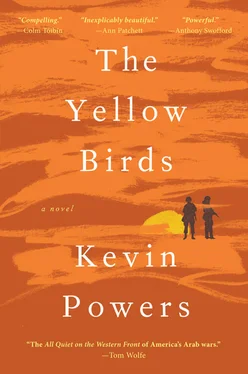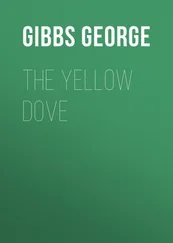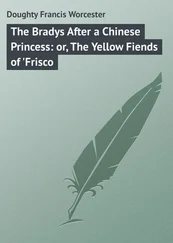“Damn,” Murph said.
“What?”
“You think this is really the most important thing we’ll ever do, Bartle?”
I exhaled. “I hope not.”
The LT sat down in his chair again. The low crackle and hum of the radio was back on. The wind seemed to pick up a little and we watched the fires again in the hills. He looked scared and tired and he rubbed the small blemish on his face with the tips of two fingers. I forget most of the time that he was only a few years older than the rest of us, twenty-three or twenty-four, I’d guess. I never took the time to ask. He appeared older, though, like Sterling, and carried himself that way, or maybe we just granted him extra years because he’d done things we hadn’t: drunk at college parties with girls wild enough to run back into a strange room on a dare from their friends, driven a brand-new car.
“How many times have we been through that orchard, through this town, sir?” a PFC from third squad asked.
“The army?”
“Yes, sir.”
“This makes three.”
“All in the fall?”
“Yeah, seems like we’re fighting over this town every year.”
I thought of my grandfather’s war. How they had destinations and purpose. How the next day we’d march out under a sun hanging low over the plains in the east. We’d go back into a city that had fought this battle yearly; a slow, bloody parade in fall to mark the change of season. We’d drive them out. We always had. We’d kill them. They’d shoot us and blow off our limbs and run into the hills and wadis, back into the alleys and dusty villages. Then they’d come back, and we’d start over by waving to them as they leaned against lampposts and unfurled green awnings while drinking tea in front of their shops. While we patrolled the streets, we’d throw candy to their children with whom we’d fight in the fall a few more years from now.
“Maybe they’ll make it an annual thing,” Murph snapped.
Sterling came over from around the hawthorn where he had cleaned and loaded his weapons and taped down loose and moving parts so that they would not rattle. “Check me out, little man,” he told Murph. He jumped up and down, his hands at his sides. Silence. The only sound he made was the soft humph of his boots tamping down the fine dust. “All right. Good. Bartle, come over here, please.”
I moved over toward Sterling and Murph and watched as Sterling placed black electrical tape over the shiny, metallic pieces of gear that could protrude and reflect a glint of light in through a window in the predawn as we walked. Murph stood there motionless, and Sterling adjusted his equipment firmly and carefully. The look on his face was one of care. He bit at his lip, furrowed up his brow and turned the corners of his mouth down ever so slightly. When he was finished he rubbed his hands along the length of Murph’s body, almost caressing him. “Give it a shot,” he said.
Murph looked over to me and jumped off the ground a little and nothing moved or made a noise.
“Your turn, Bartle.”
He repeated the process for me, the same look of concern marking his face. When I jumped, there was no sound and Sterling patted me on the side of the helmet.
“Sarge,” I asked, “do you think we’re gonna have to fight here every year?”
“Hell yes, Private,” he said. “I was already in the first one. This shit’s gonna be bigger than Ohio State — Michigan.” He chuckled. He could tell I was nervous again. “Don’t worry. We’re gonna do all right tomorrow, OK? Just follow me, do what I say, and we’ll be back on the FOB before you know it.”
He smiled at both of us. He seemed to soften in the strange light from the lamppost. “OK, Sarge. Sure. We’ll follow you all the way.”
In the morning we woke to the narrow whine of mortars as they arced over our position and crumpled into the orchard. It remained dark. The sky was the color of brittle charcoal. What always happened to me before a fight happened then: a feeling I’d never felt until I went to the high desert to fight. Every time it came I searched for something to make the knot in my chest make sense, to help me understand the tremble that took over my thighs and made my fingers slick and clumsy. Murph once came close to describing it. A reporter had asked us what combat felt like. He’d worn a khaki outfit festooned with pockets and mirror-lens aviator glasses that could blind you from a hundred yards away. We hated having him around, but we’d been ordered to tolerate him, so when he came up to a group of us lounging in the dust beneath a large shade tree on base, saying, “Tell me the essence, guys, I want to know the kind of rush you get,” most of us ignored him, a few told him to go fuck himself, but Murph tried to explain. He said, “It’s like a car accident. You know? That instant between knowing that it’s gonna happen and actually slamming into the other car. Feels pretty helpless actually, like you’ve been riding along same as always, then it’s there staring you in the face and you don’t have the power to do shit about it. And know it. Death, or whatever, it’s either coming or it’s not. It’s kind of like that,” he continued, “like that split second in the car wreck, except for here it can last for goddamn days.” He paused. “Why don’t you come out with us and you can take point? I’ll bet you’ll find out.” The reporter left after that, something in the way we laughed made him stutter and backpedal out of our platoon area. But Murph was right about the feeling, and every time it began my body told me it couldn’t sustain the tightened muscles and sweat. But it didn’t end, so I tried not to pay attention to it.
“Noise and light discipline from here on out, boys,” the LT whispered. I was glad not to be out on the point. The guy who was swung his leg over the low wall separating our position from the open field and walked out toward the gray shapes of the city.
Sterling took a small canister of salt out of his ruck while we waited for our squad’s turn to move out. I remember that there was a picture of a girl with an umbrella on the label. Morton’s, I think. He turned the cylinder over and began to shake it over the earth beneath the hawthorn tree. I looked at Murph, and he returned my questioning expression, and we walked toward Sterling. “Uh, Sarge, are you all right?” Murph asked. Sterling spread the salt over the ground where we’d been set up the night before.
“It’s from Judges,” he said, without really noticing us. Then he looked up and seemed to look past us, out into the end of the night, which somewhere over the horizon line prepared to reveal itself as day. “Move out, guys,” he said. “It’s just a thing I do.” So we did. In the distance behind us Sterling walked, just barely in sight, spreading salt over the fields and alleys, over the dead bodies and into the dust that seemed to cover everything in Al Tafar. He spread it wherever he went, the whole time singing or muttering in a voice neither of us had ever heard him use before. It was a pleasant voice, friendly, and although we couldn’t make out the words, it terrified us.
“I think he’s losing his shit, Bart,” Murph said.
“You want to tell him?” I asked.
The mortars still fell. A few times a minute we twitched from the noise of the loud impacts like kettledrums banging in the orchard. Small fires burned. The smoke rose from among the frayed leaves. Once, when it was nearly light, Murph said, “I’m gonna see what Sterling’s up to.” He raised his rifle to use the magnification scope to look back at him.
“Well?”
There was a brief flash of light as the first faint rays crested the foothills to the east and fell along the roofs and walls of the buildings’ pale facades. I looked back and put my hand up on my brow line trying to focus on his figure, barely perceptible in the receding dark. “Well?” I repeated, “What is he doing?”
Читать дальше












